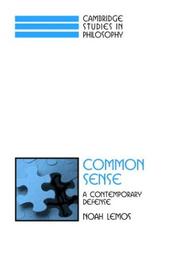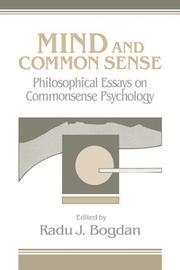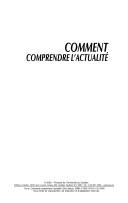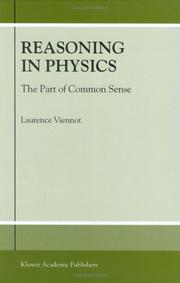| Listing 1 - 10 of 11 | << page >> |
Sort by
|
Book
ISBN: 178527550X 1785275496 1785275518 9781785275517 9781785275500 Year: 2020 Publisher: London : Anthem Press,
Abstract | Keywords | Export | Availability | Bookmark
 Loading...
Loading...Choose an application
- Reference Manager
- EndNote
- RefWorks (Direct export to RefWorks)
Common Sense and Science from Aristotle to Reid reveals that thinkers have pondered the nature of common sense and its relationship to science and scientific thinking for a very long time. It demonstrates how a diverse array of neglected early modern thinkers turn out to have been on the right track for understanding how the mind makes sense of the world and how basic features of the human mind and cognition are related to scientific theory and practice. Drawing on a wealth of primary sources and scholarship from the history of ideas, cognitive science, and the history and philosophy of science, this book helps readers understand the fundamental historical and philosophical relationship between common sense and science.
Science --- Common sense --- Normal science --- Philosophy of science --- Horse sense --- Judgment --- Knowledge, Theory of --- Prudence --- Reason --- Philosophy.

ISBN: 0521837847 051121734X 9780511217340 0511213743 9780511213748 051121197X 110716186X 1280540575 051121555X 0511315929 0511498802 0521143454 Year: 2004 Volume: *27 Publisher: New York Cambridge University Press
Abstract | Keywords | Export | Availability | Bookmark
 Loading...
Loading...Choose an application
- Reference Manager
- EndNote
- RefWorks (Direct export to RefWorks)
In this 2004 book, Noah Lemos presents a strong defense of the common sense tradition, the view that we may take as data for philosophical inquiry many of the things we ordinarily think we know. He discusses the main features of that tradition as expounded by Thomas Reid, G. E. Moore and Roderick Chisholm. For a long time common sense philosophers have been subject to two main objections: that they fail to give any non-circular argument for the reliability of memory and perception; and that they pick out instances of knowledge without knowing a criterion for knowledge. Lemos defends the appeal to what we ordinarily think we know in both epistemology and ethics and thus rejects the charge that common sense is dogmatic, unphilosophical or question-begging. Written in a clear and engaging style, this book will appeal to students and philosophers in epistemology and ethics.
Common sense --- Horse sense --- Judgment --- Knowledge, Theory of --- Prudence --- Reason --- Common sense. --- Knowledge, Theory of. --- Epistemology --- Theory of knowledge --- Philosophy --- Psychology --- Arts and Humanities
Book
ISBN: 1474417868 147441785X 1474438652 9781474438650 9781474417853 9781474417846 1474417841 9781474417860 Year: 2017 Publisher: Edinburgh
Abstract | Keywords | Export | Availability | Bookmark
 Loading...
Loading...Choose an application
- Reference Manager
- EndNote
- RefWorks (Direct export to RefWorks)
With a new reading of Thomas Reid on primary and secondary qualities, Christopher A. Shrock illuminates the Common Sense theory of perception. Shrock follow's Reid's lead in defending common sense philosophy against the problem of secondary qualities, which claims that our perceptions are only experiences in our brains, not of the world.
Perception (Philosophy) --- Common sense. --- Knowledge, Theory of. --- Epistemology --- Theory of knowledge --- Philosophy --- Psychology --- Horse sense --- Judgment --- Knowledge, Theory of --- Prudence --- Reason --- Reid, Thomas, --- Jui-te, Tʻo-ma-ssu,
Book
ISBN: 1108515592 1316584704 1108506658 1107151007 Year: 2017 Publisher: Cambridge : Cambridge University Press,
Abstract | Keywords | Export | Availability | Bookmark
 Loading...
Loading...Choose an application
- Reference Manager
- EndNote
- RefWorks (Direct export to RefWorks)
Commonsense psychology refers to the implicit theories that we all use to make sense of people's behavior in terms of their beliefs, goals, plans, and emotions. These are also the theories we employ when we anthropomorphize complex machines and computers as if they had humanlike mental lives. In order to successfully cooperate and communicate with people, these theories will need to be represented explicitly in future artificial intelligence systems. This book provides a large-scale logical formalization of commonsense psychology in support of humanlike artificial intelligence. It uses formal logic to encode the deep lexical semantics of the full breadth of psychological words and phrases, providing fourteen hundred axioms of first-order logic organized into twenty-nine commonsense psychology theories and sixteen background theories. This in-depth exploration of human commonsense reasoning for artificial intelligence researchers, linguists, and cognitive and social psychologists will serve as a foundation for the development of humanlike artificial intelligence.
Reasoning. --- Common sense. --- Psychology. --- Behavioral sciences --- Mental philosophy --- Mind --- Science, Mental --- Human biology --- Philosophy --- Soul --- Mental health --- Horse sense --- Judgment --- Knowledge, Theory of --- Prudence --- Reason --- Argumentation --- Ratiocination --- Thought and thinking --- Judgment (Logic) --- Logic

ISBN: 0521402018 0521069394 0511551657 0511832753 9780521402019 9780511551659 9780521069397 Year: 1991 Publisher: Cambridge: Cambridge university press,
Abstract | Keywords | Export | Availability | Bookmark
 Loading...
Loading...Choose an application
- Reference Manager
- EndNote
- RefWorks (Direct export to RefWorks)
The contributors to this volume examine recent controversies about the importance of common sense psychology for our understanding of the human mind. Common sense provides a familiar and friendly psychological scheme by which to talk about the mind. Its categories (belief, desire, intention, consciousness, emotion, and so on) tend to portray the mind as quite different from the rest of nature, and thus irreducible to physical matters and its laws. In this volume a variety of positions on common sense psychology from critical to supportive, from exegetical to speculative, are represented. Among the questions posed are: Is common sense psychology an empirical theory, a body of analytic knowledge, a practice or a strategy? If it is a legitimate enterprise can it be naturalized or not? If it is not legitimate can it be eliminated? Is its fate tied to our understanding of consciousness? Should we approach its concepts and generalizations from the standpoint of conceptual analysis or from the philosophy of science?
Logic --- Philosophy --- Psychological Theory --- Common sense --- Philosophy of mind --- Psychology --- Sens commun --- Philosophie de l'esprit --- Psychologie --- Philosophie --- Philosophy of mind. --- Common sense. --- Philosophy. --- Logic. --- Psychological Theory. --- Arts and Humanities --- Psychology - Philosophy. --- Horse sense --- Judgment --- Knowledge, Theory of --- Prudence --- Reason --- Mind, Philosophy of --- Mind, Theory of --- Theory of mind --- Cognitive science --- Metaphysics --- Philosophical anthropology
Book
ISBN: 1430241527 1430241535 Year: 2013 Publisher: Berkeley, CA : Birmingham : Apress ; Computer Bookshops [distributor],
Abstract | Keywords | Export | Availability | Bookmark
 Loading...
Loading...Choose an application
- Reference Manager
- EndNote
- RefWorks (Direct export to RefWorks)
“He may have an MBA, but he’s got no common sense.” Assessments like that by a boss can stop a career dead in its tracks. Unfortunately, many believe that common sense is a trait you are either born with or you are not. This book dispels that myth. Through the pages of Common Sense: Get It, Use It, and Teach It in the Workplace readers will learn not only what common sense is, but how to acquire it and use it to enhance their careers, increase their confidence, and take better advantage of business opportunities. Common Sense explores the use—and non-use—of common sense in the workplace and the world around us. It shows how you can become a person of great wisdom and good judgment by simply learning about all the ways people stumble in the thought process. Author Ken Tanner, a seasoned manager, consultant, and former regional vice president for two major U.S. restaurant chains, shows readers how to make better decisions, how to spot and avoid fallacious thinking, how to better assess ambiguous situations, and how to become a mature thinker with a knack for making the right move at just the right time. Best of all, Common Sense shows how to teach this trait to others, especially subordinates and co-workers who can and will do nonsensical things unless you help them learn to reason through their decisions and actions quickly and confidently. The payoff? Your staff will make you look good, greasing the way for greater responsibility and opportunity. This book: Takes you through an understanding of the term "common sense"—what it means and what it doesn’t mean. Shows how fallacies create barriers to using common sense. Provides dozens of examples of the application (as well as rejection) of common sense in the business world and elsewhere. Shows how to teach common sense to others.
Economics. --- Economics/Management Science. --- Business/Management Science, general. --- Commerce --- Management --- Business & Economics --- Local Commerce --- Management Theory --- Common sense. --- Success in business. --- Horse sense --- Business. --- Management science. --- Business and Management. --- Business and Management, general. --- Quantitative business analysis --- Problem solving --- Operations research --- Statistical decision --- Trade --- Economics --- Industrial management --- Judgment --- Knowledge, Theory of --- Prudence --- Reason --- Business --- Business failures --- Creative ability in business --- Prediction of occupational success

ISBN: 2760518604 1435685156 9781435685154 9782760518605 9782760527249 2760527247 2760513769 Year: 2006 Publisher: Québec [Que.] : Presses de l'Université du Québec,
Abstract | Keywords | Export | Availability | Bookmark
 Loading...
Loading...Choose an application
- Reference Manager
- EndNote
- RefWorks (Direct export to RefWorks)
Ce livre explore le mécanisme de construction du réel sur les différentes scènes de la vie : de l'imaginaire national aux légendes contemporaines ; de la vie institutionnelle à la scène politique et médiatique ; de la vie quotidienne à la pensée savante. Les ressorts de l'imaginaire se révèlent souvent identiques ; les gens dans leur vie quotidienne, les dirigeants sur la scène du pouvoir, les journalistes sur la scène médiatique et les savants dans leurs pratiques institutionnelles recourent sans cesse aux symboles et aux mythes, au rituel et au cérémonial.
History, Modern --- Social epistemology. --- Common sense. --- Mass media --- Communication --- Current events. --- Social influence. --- Social perception. --- Influence (Psychology) --- Social psychology --- Prestige --- Social pressure --- Cognition, Social --- Interpersonal perception --- Social cognition --- Interpersonal relations --- Perception --- Social cognitive theory --- Epistemology, Social --- Knowledge, Theory of --- Social role --- Knowledge, Sociology of --- Horse sense --- Judgment --- Prudence --- Reason --- Communication and culture --- Current events --- Events, Current --- Social aspects. --- Study and teaching

ISBN: 9780792371403 0792371402 9780306476365 9786610201204 1280201207 0306476363 Year: 2001 Publisher: Dordrecht, Netherlands ; Boston, Massachusetts : Springer,
Abstract | Keywords | Export | Availability | Bookmark
 Loading...
Loading...Choose an application
- Reference Manager
- EndNote
- RefWorks (Direct export to RefWorks)
For a meaningful understanding of physics, it is necessary to realise that this corpus of knowledge operates in a register different from natural thought. This book aims at situating the main trends of common reasoning in physics with respect to some essential aspects of accepted theory. It analyses a great many research results based on studies of pupils and students at various academic levels, involving a range of physical situations. It shows the impressive generality of the trends of common thought, as well as their resistance to teaching. The book's main focus is to underline to what extent natural thought is organised. As a result of this mapping out of trends of reasoning, some suggestions for teaching are presented; these have already influenced recent curricula in France. This book is intended for teachers and teacher trainers principally, but students can also benefit from it to improve their understanding of physics and of their own ways of reasoning.
Physics --- Common sense. --- Physique --- Sens commun --- Philosophy. --- Philosophie --- Education. --- Physics. --- Science_xStudy and teaching. --- Common sense --- Physics - General --- Physical Sciences & Mathematics --- Philosophy --- Science education. --- Teaching. --- Science Education. --- Physics, general. --- Teaching and Teacher Education. --- Science --- Study and teaching. --- Didactics --- Instruction --- Pedagogy --- School teaching --- Schoolteaching --- Education --- Instructional systems --- Pedagogical content knowledge --- Training --- Natural philosophy --- Philosophy, Natural --- Physical sciences --- Dynamics --- Science education --- Scientific education --- Horse sense --- Judgment --- Knowledge, Theory of --- Prudence --- Reason

ISBN: 2020225069 9782020225069 Year: 1998 Publisher: Paris : Seuil,
Abstract | Keywords | Export | Availability | Bookmark
 Loading...
Loading...Choose an application
- Reference Manager
- EndNote
- RefWorks (Direct export to RefWorks)
Ce livre retrace les conflits de la théorie de la littérature et du sens commun. La théorie refuse les préjugés du sens commun : la littérature comme essence ; l' auteur comme autorité donnant sens au texte ; le monde comme sujet de l'œuvre ; la lecture comme conversation entre un auteur et son lecteur ; le style comme choix à une manière d'écrire ; l'histoire littéraire comme procession des grands écrivains ; enfin la valeur comme propriété objective du canon littéraire. La théorie a ébranlé le sens commun, mais le sens commun a résiste à la théorie. Et celle et a souvent farce le noir pour réduire son adversaire au silence, au risque de s'enfermer dans des paradoxes. Il est temps de revenir sur les grandes années de la théorie littéraire en France et hors de France, afin d'en proposer un bilan.
Literature --- French literature --- Common sense. --- Littérature --- Littérature française --- Sens commun --- Philosophy --- History and criticism --- Theory, etc. --- Philosophie --- Histoire et critique --- Théorie, etc --- Common sense --- 840 --- -Literature --- -Criticism --- Appraisal of books --- Books --- Criticism --- Evaluation of literature --- Literary criticism --- Rhetoric --- Aesthetics --- Style, Literary --- Belles-lettres --- Western literature (Western countries) --- World literature --- Philology --- Authors --- Authorship --- Horse sense --- Judgment --- Knowledge, Theory of --- Prudence --- Reason --- Franse literatuur --- -Theory, etc --- Appraisal --- Technique --- Evaluation --- Criticism. --- Philosophy. --- 840 Franse literatuur --- Littérature --- Littérature française --- Théorie, etc --- Literature - Philosophy --- French literature - History and criticism - Theory, etc. --- Ecrivains et lecteurs --- Réception
Book
ISSN: 03787893 ISBN: 2803100177 9782803100170 Year: 1980 Volume: 2e sér., t. 64, fa Publisher: Bruxelles: Palais des Académies,
Abstract | Keywords | Export | Availability | Bookmark
 Loading...
Loading...Choose an application
- Reference Manager
- EndNote
- RefWorks (Direct export to RefWorks)
Common sense --- History --- Reid, Thomas, --- Stewart, Dugald, --- History. --- 1 REID, THOMAS --- 1 STEWART, DUGALD --- 1 <411> "17" --- Filosofie. Psychologie--REID, THOMAS --- Filosofie. Psychologie--STEWART, DUGALD --- Filosofie. Psychologie--Schotland--18e eeuw. Periode 1700-1799 --- 1 <411> "17" Filosofie. Psychologie--Schotland--18e eeuw. Periode 1700-1799 --- 1 STEWART, DUGALD Filosofie. Psychologie--STEWART, DUGALD --- 1 REID, THOMAS Filosofie. Psychologie--REID, THOMAS --- Reid, Thomas --- Stewart, D. --- Horse sense --- Judgment --- Knowledge, Theory of --- Prudence --- Reason --- Jui-te, Tʻo-ma-ssu, --- Theory of knowledge --- Libre arbitre --- Théorie de la connaissance --- Hume, David --- Common sense - History --- Reid, Thomas, - 1710-1796 --- Stewart, Dugald, - 1753-1828 --- Reid, thomas (1710-1796) --- Stewart, dugald (1753-1828) --- Théorie de la connaissance
| Listing 1 - 10 of 11 | << page >> |
Sort by
|

 Search
Search Feedback
Feedback About UniCat
About UniCat  Help
Help News
News